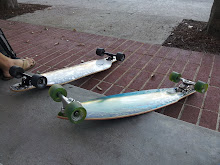This was part of a reaction paper I wrote for another class, but thought I'd share it here too: I had an interesting discussion with a cellist friend of mine today (as I was sitting in traffic on the West Side. Rango, the movie with Johnny Depp’s voice just came out, and they blocked off a few streets in Westwood for the premiere... and I’m sure I can get into a discussion about how pop/mass culture such as a Johnny Depp Hollywood movie can cause physical discomfort and inconvenience for even those not involved, both spatially and temporally, given the power of said culture industry, but I’ll save that for another day), about why young people don’t like classical music. Or why classical music is not popular. My thinking on this is two-fold. On one hand, borrowing from Gross’s notion of symbolic competence, we are not trained competently in music as a language. We do not need music as a foundational competence in order to function in our society like we do linguistic competence (we need to know how to read, write, speak, and understand the English language), and hence, we do not know how to comprehend the musical code. I have encountered many people who say they like classical music because it is “beautiful.” They cannot give a deeper reason as to why they like it. But classical music, or all music, really, should transcend simply being “beautiful.” It’s like saying, I like listening to Italian poems because they sound beautiful, but I don’t understand Italian. We are not trained in the depth of understanding and significance of music as a language. Hence, pop songs use the English language - words - to supplement the music, while rendering the music in these pop songs to the pseudo-differentiated mindless drone Adorno says it is, with conventional and predictable chord progressions that flatter the listener when it is expected and realized. But people who are trained in English as a basic symbolic competency are able to draw a narrative, to draw meanings, from pop music because of its words, in ways that they are unable to draw deeper meanings from the word-less, strictly instrumental pieces of classical music. Hence, a musical competency requires time and education (to go above and beyond the basic competency of the English language), and a certain socioeconomic and class status, which follows Bourdieu’s statement about cultural capital, effectively making classical music cognitively and meaningfully inaccessible to the “masses.” So the question becomes, how can we change that? What can be done with classical music in order to get more people interested in it? Can we popularize classical music without bastardizing it (like what Vanessa Mae does - example here: http://www.youtube.com/watch?v=euOu89d3npA)? Can we get people interested in classical music without compromising the purity of music (by techno-fying, or adding rhythms and percussion and a bass beat) that has been in existence for 300, 400 years? Let us set aside, for the moment, that wanting to keep classical music “pure” may be, in fact, problematic in itself. My thoughts are that it is hard to change a culture, to change people’s habits of listening. We have an idea of what entertainment is, of what interesting art is, and classical music just isn’t it. It just ain’t hip enough for the young ‘uns.
Subscribe to:
Post Comments (Atom)




No comments:
Post a Comment